A Changing Highway
Nostalgic stories about US Highway 89 usually focus on the stretch through central Utah – rural highway and small town Main Streets. I spent 44 years living on a rather different and dramatically changing stretch of Highway 89 – the expanding suburbia of South Ogden. Our back yard backed the highway near Mile Marker 410.
I remember shortly after moving here in 1980, I would give people directions to turn right at the first stoplight past the big intersection with Harrison Boulevard after coming up the hill from Uintah. Now there are three more traffic lights. Here this is a main highway, but is still very much “Main Street”. There is cross traffic in a road with a 50 mile per hour speed limit.
My husband would always give people directions by saying that if you stood on the steps of the Armory and looked north across the highway, you would see our back yard. Next to the Armory was the DMV – Drivers License Division. How many people walk to the DMV to get a drivers license renewed? I have.
The great advantage to where we lived was the easy access the highway provides to get most anywhere we needed to go. One of the downsides was always the noise, which increased over the years with more traffic, making it necessary to raise voices during conversations on the deck or to get the attention of children running around the yard. At times of the year when many people enjoy cool air blowing through open windows, ours remained closed so we could hear conversations or get some sleep.
The street we lived on used to be a dead end street. Then it was developed further east and a new road , Glasmann Way, was put in intersecting it going north to south. Later, Chambers Ave was extended and that stretch east of Glasmann was filled in with strip malls. It did give us a gas station with convenience store within walking distance and an Artic Circle which was fun to walk to with kids to for ice cream in the summer. Further down was a Tunex/Master Muffler/Master Auto Tech – changing names but same building and some of the same staff. This became my easy go to for oil changes and emissions tests. I could drop the car off and walk home, or just walk around the area or visit someone while it was worked on.
Our children went to an elementary school across the highway. Though it was technically within “walking distance”, during the years our kids went there they were bussed rather than risk them crossing this busy street. When our first child was in kindergarten she would come home car sick. It took a while to realize that this was because she rode the bus through the whole route down to lower Uintah and then back up and was the last one dropped off. Eventually, after our kids were out of school, they made changes. For several years kids walked across the highway with a crossing guard. We enjoyed seeing a number of crossing guards through the years, including one who was criticized for his overzealous waving. Now most of the neighborhood is bussed to another school.
We didn’t have an actual turn lane at our corner for years. A hole formed where the pavement ended and it was tricky to get over far enough to not be run over by someone behind who was still going 50 MPH when you slowed to turn, but not to go so far that your tire went into the hole or you went all the way off. At times when road crews were working nearby, I would stop and ask if they could just put some asphalt to fill in the hole and they said that wasn’t what they were there to do. It became a pet peeve of mine, especially after they put right turn lanes on the other intersections. Then one fall, after I spent a week in Salt Lake City for a conference, I came home and to my surprise, there was a turn lane – complete with lines painted.
A Yard Backing the Highway
One of the first things we did to our yard was to plant a row of spruce trees in the back along with some pyracantha bushes along the fence line. We thought we planted the trees far enough in from the fence line. Over time this became a green wall blocking the view of traffic and giving us a pleasant looking back yard. They did grow high enough and close enough to the fence to necessitate the power company repeatedly coming to whack away branches that were too close to the power lines, leaving the trees lopsided.
We had prime space for political signs along our back fence, at least until the pyracantha got out of control. We supported some of our friends’ political ambitions, though not always successfully. The “Pioneer Museum” sign was in back of our house for years. Then one day someone apparently ran off the road and flattened it. It was removed and placed a few miles further back on the road. That could have been seen as an omen. Though the sign came down before I got heavily involved with the DUP Museum, my experience with the Museum turned out more like the downed sign.
Home Improvements
Living 44 years in a house that was old when we moved in meant lots of work and money through the years. We made many improvements to the house itself and to the yard. When we moved in, there was a deck that had been added to the back of the house when the kitchen was expanded to create a dining area. We didn’t wait long to enclose that deck into a sunroom. Turns out it was either too cold or too hot, mostly depending on whether the sun was shining.
Later we did a total remodel of the kitchen and turned the sunroom into a living area. Then after that we built a big deck on the back.
Trees
Nature took its toll on the yard and we didn’t have great luck with trees. When we moved in there were three fruit trees – a peach tree that grew delicious peaches, a plum tree, and a cherry tree. The peach tree got diseased and left us first.
Living in an area prone to canyon winds that blew from the east, we had large pine trees on the west side of the driveway that blew over during different wind storms. The 2016 Terrace Tornado took down two spruce trees, one of which took out half of the plum tree.
We tried planting other trees just for shade. A catalpa ended up splitting and dying. We planted a mulberry tree closer to the house and waited for it to grow big enough for some good shade. Then an early snow storm in 2011 split the tree when it was still full of leaves. We tried to save it but it never really recovered and we eventually had it removed. That left the deck pretty exposed and not shady.

Our cherry tree, that had been continuous shade even after we lost spruce trees and became the large tree that grandkids liked to climb and in which we had a rope swing, just died. It never was really great with supplying cherries. They tended to get worms because we weren’t good at spraying, but mostly the birds ate them all. They were really good tasting cherries, but by the time they were ripe there weren’t many without bird bites left and most were just picked off. We had one year that was amazingly unusual – 2019. The tree was covered with more than they birds could eat. We ended up with the kids climbing all over picking bag after bag of cherries. It was insane.
But then we also got branches dying. We trimmed some off but more had no leaves. Then 2023 started off with blossoms which produced lots of very, very tiny cherries. This was an unusually hot summer and as the summer went on, the leaves turned brown and fell off. Well before the end of the summer there were no leaves left. It was just dead.
Gardens
We had a large back yard which seemed perfect for gardening. My husband had an interesting design idea to create two round garden areas with a strip connecting them. Picture eyeglasses with cement curbing. One circle was flat and filled with vegetables and in the other was a hill with rocks and flowers.
We planted some flowers in the strip, but it soon was taken over with grass, so eventually we took that out. For years we still had some early flowers springing up from bulbs until they were mowed.

The vegetable garden turned out to be a lot of work, some years more productive than others. Eventually the spruce trees and our cherry tree grew and this area became more shaded. I am not totally sure that is why the garden didn’t seem to thrive. It could have also been because the soil was depleted or we were just neglectful. The shade did seem to be an issue and the garden more work than I wanted to do, so we finally had that area sodded over. That was before we lost most of the trees and it was again very sunny there.


The flower garden evolved over time in kind of a haphazard way. We started with some tulip and daffodil bulbs which were pretty in the spring. My husband got into planting marigolds and petunias for a number of years and they kind of took over. We entered some in the County Fair and won a ribbon.

When my grandfather dug up his iris bulbs shortly before he died, I planted some of them on this hill. In time they kind of took over, so later I was digging some of them up.

I was given some flower seeds and threw some out there. Some columbine came up and spread and I really enjoyed. I also had gladiolas come up, which was a surprise. Friends gave us yucca and peonies which grew and grew. I planted a little rose that a friend gave me in a little pot and it eventually became a big rose bush.
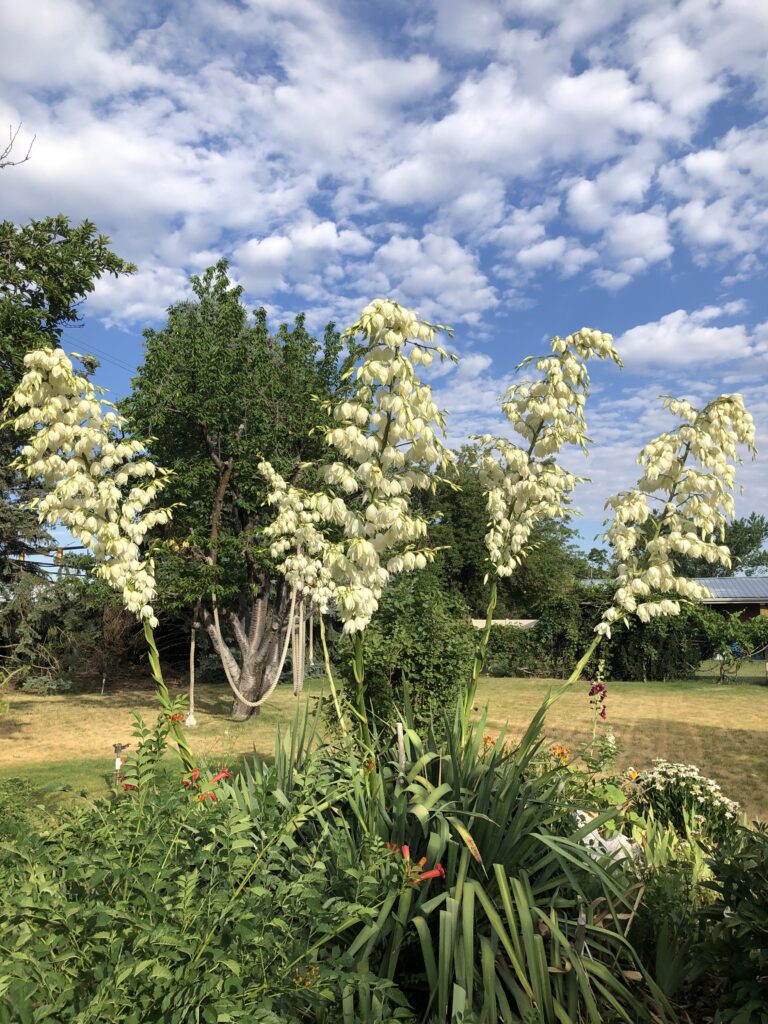

Critters
We lived in a suburb, but there was still wildlife around, some which occasionally became roadkill. I don’t recall ever seeing a skunk in the yard, but smelled plenty of them. Sometimes other critters bit it on that stretch of road. I never saw racoons in the yard either, but I am sure they stripped our grapevines of grapes one night before I got out to pick them. Some people in the area watched deer eat their shrubbery. I recall seeing one deer jump our east fence, run through the yard and then exit our west.
One year, when the kids were very young, someone apparently dumped some kittens along the road. My kids found them. I am allergic to cats, so was not excited with their wanting to keep these. They were really small, probably newborn. We kept them in the garage – not a cold time of year – and I tried to keep them alive by feeding them with a syringe. It did not go well, and was exhausting. Eventually, I took them to the shelter and can assume what their fate was, but didn’t tell the kids. I did try.
We had squirrels and lots of birds. My husband put up some birdhouses in the back yard – not really functional ones. We were more likely to get birds nests in the trees. He also liked to feed the birds, so we had lots of different kinds. It was fun to see little quail families with babies following mom. We had some black birds who thought this was their territory and we were the intruders. They got so loud and even would dive bomb at my head. They ate most of our fruit and even went after vegetables in the garden.
For some reason we stored some bird seed in the sunroom early on. Well, birds are not the only ones who like bird seed. Mice do too. We had some fun times trying to get them out of the house. Later, we stored the bird seed in the garage and the mice went there. Our first dog, Molly, once brought me a gift of a dead mouse and placed it on my kitchen floor.
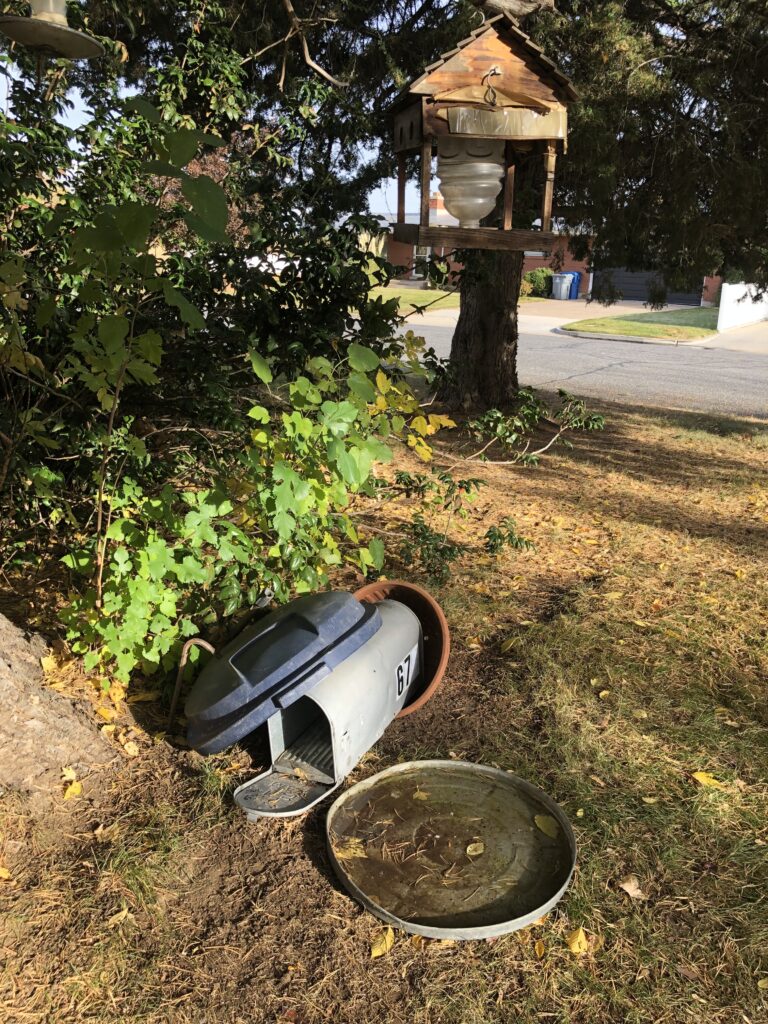
We hung a bird feeder on the last big pine tree on the west of the house and later my husband (affected by his brain injury) put bread and stuff on the ground. I accused him of feeding rats, which turned out to be true. One year it got so bad we got traps from a pest place.
The last summer we were in the house, I noticed some holes in the back lawn. I wasn’t sure then what was making them. I really didn’t want to know. Then winter came. We moved early the next spring but not before I noticed the holes had gotten much worse. It seems we may have left the new owners with some voles. Sorry.
Fireworks
For years our backyard was a prime place to watch the South Ogden Days fireworks. As the spruce trees grew larger, we viewed them a few years from the roof. Eventually, we had to go around and watch from the roadside, or more pleasantly from the grassy area across the street, or walk further to join the crowds at the park. Then they started setting fireworks off from another location and we again had a perfect view through the space between our easternmost tree and the neighbor’s yard.
The Terrace Tornado of 2016 took down two of our spruce trees, opening up our view of the street, the power pole, the flagpole at the armory, and giving us a better view of the fireworks in the space where trees were.
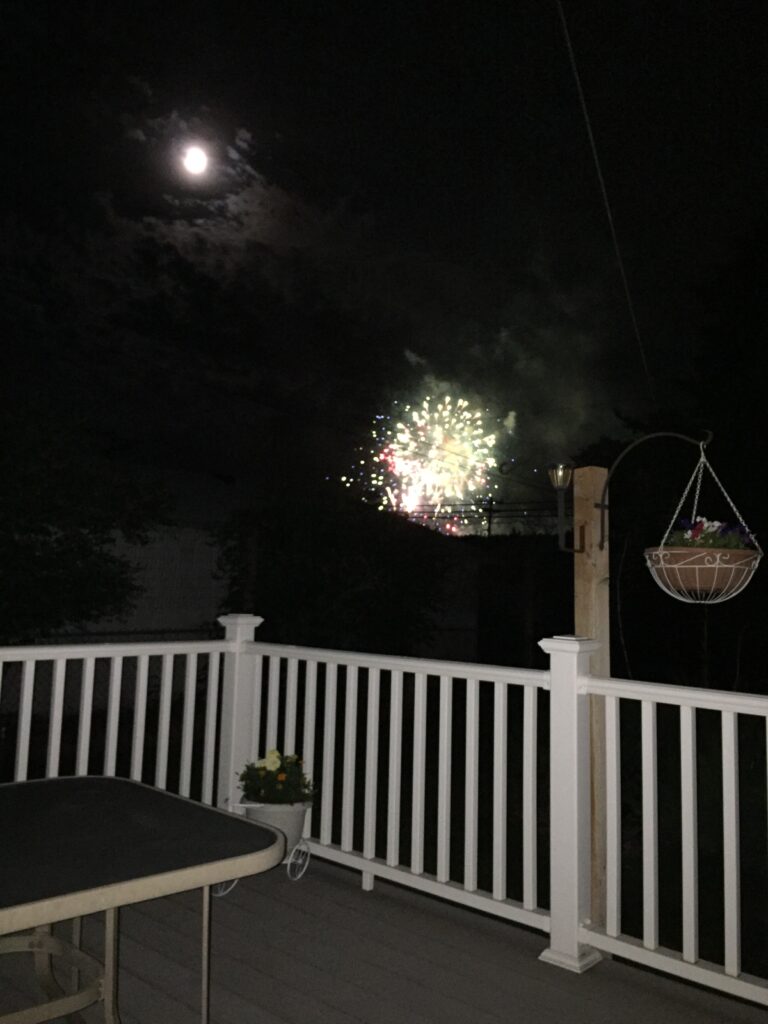
In 2018 and later years, I actually watched The Motherload fireworks from inside the house – a little lazy in my old age. We had the large deck by then, but I could sit inside and watch through the door going out to the deck.
Olympic Torches
Each year that the Olympics have been held in the United States, the Olympic Torch has traveled along Highway 89 and past our home on its way to the Olympic Village. That has given me a front row – or back yard – seat for the parade.
We watched the torch headed for Los Angeles from the back yard. The Spruce trees we planted had not grown too big to see over. For the Atlanta Olympics, all the kids from the elementary school, including my own, gathered on the other side of the highway with banners to watch. In 2002, for the Salt Lake City Winter Olympics, we got to see the torch twice. We waited in a parking lot in the evening as the torch came into town. The next morning, we gathered down the road a bit where the Bonneville High School kids gathered to cheer on one of their own carrying the torch.
Fires – Number 1
Every summer in Utah we hear of fires and often have smoke filled skies for days on end. Sometimes there are ones close enough that we watch them burn. One summer night about 10:00 p.m., our usually quiet neighborhood was all ablaze with excitement – sirens blaring, people running from house to house waking up anyone who had already gone to bed. Our next door neighbor was frantically hosing down the trees that lined his back fence along the highway, which it turned out was the only thing that saved our yard and possibly our house. The neighbor on the other side of him was hysterical. Trees in her backyard were already on fire. She was rushing her kids and dogs out of the house, afraid it would be next. We watched anxiously with neighbors as embers flew over our yards – and prayed that our trees did not catch fire.
The fire department was quick and efficient, but when it was all over there were four or five scorched back yards, many trees and a wooden fence gone, and a power pole down along with electricity to several houses. The suspected cause was a cigarette someone casually threw out a car window as they drove down the highway. It created or intensified a bond between neighbors who shared a common fear and supported each other through what could have been a much worse ordeal – something reminisced about again and again – the night the neighborhood burned.
Fire Number 2
As some neighborhoods have block parties, ours had fires. We had another fire in 2021. This one started with a bang – like an explosion. Turns out the transformer on the pole in our next door neighbor’s yard blew. We had been warned about some power disruptions in the neighborhood because of work the power company was doing. I guess something they did caused a surge or something. Anyway, we were again gathered around with our neighbors watching a fire that could have been disastrous. By that time, trees in our yard were large and probably could have easily brought the fire to the house. The fire department was very fast and amazing to get it under control very quickly. It just wiped out half the trees along our neighbors fence line, but stopped before reaching our yard.
Accidents
It became such a common thing to hear sirens along the highway that eventually we hardly noticed. We also heard many screech and crash sounds. In the days before cell phones, I would often run out, take a peek, and then run back in the house to call 911. Sometimes I hung around, but wasn’t really helpful. I do recall trying to comfort and reassure scared teenagers sure that parents were going to kill them for smashing the car. One time, I covered a shivering kid with a blanket from my car. I never did get that quilt back, but a neighbor girl was the other driver in that accident and her mother made us a quilt to replace the one we lost.
When we heard sirens, we always wondered if anyone we knew was in the accident. Too often it was our neighbors or people we know. I never actually saw a fatal accident on our corner, but there have been some there and at the other intersections down the road.
Accidents – The Big One
There are accidents and then there are accidents. My husband used to sing a John Prine song about an accident. The chorus goes “You don’t know how lucky you are. You might have run into that tree, got struck by a bolt of lightning, or raped by a minority.” That helped give some perspective when our teenage daughters got in relatively minor accidents. Yes, there are worse things than car accidents, especially if they are the small ones – the ones that are a hassle and inconvenient annoyance. I remember as a parent of new drivers hoping that their first accident would be a very minor one. Seems like they all have one – we just don’t want it to be a big one that seriously injures them.
But then there are the big serious accidents – a whole different, life altering event. They say that most accidents happen close to home, so we had the double irony of the “big one” occurring right at the intersection by our house on a summer evening in 2014.
Somehow, I don’t think my mind wanted to consider that this was really that kind of accident. Just wanted to think of a smashed car and a few slight injuries. But no, this was one that very well might have resulted in one of those makeshift shrines on the side of the road. My husband was driving his 1971 Carman Ghia straight across the street to return it to his mother’s garage after putting new Vintage license plates on it. He was hit by an impaired driver who blew through the red light. If flipped his car around so it hit a truck stopped at the light going the other way. He was thrown from the car – 1971 seatbelts are pretty useless and he didn’t even try.
The fact that he survived can partly be attributed to the location. Emergency responders were very quickly on the scene and the hospital is only a few minutes away. His recovery can be considered miraculous though it left him with mental impairments. He recovered enough to drive on Highway 89 again for several years, which I admit made me a little anxious.
Accident Number 2
They say that lightning doesn’t strike twice in the same place, so one would hope accidents didn’t happen twice in the same place, but turns out they do. By 2017, my husband was driving again. The thing that probably saved him this time was that he was driving the Lincoln Town Car he inherited from his step-father. He was not at fault again and hit by someone distracted and not stopping for the light. Physically he was okay, but another car totaled.
Storms
We live in an area that has windstorms. The wind coming from the east often funnels through canyons and can be strong and destructive. Besides the spruce trees we planted along the back, there were large established evergreens along our west property line. These trees have shallow roots so can easily blow over, especially with the wind blowing from the east against them.
I remember a big storm in the spring of 1983, watching from the window as one of the big trees was pulled out of the ground, a little more with each gust until it slowly went over and landed on the ground. After a couple of others went over during a later storm, we had to run to the emergency room with my father-in-law who cut his thumb off with a chainsaw as he was cutting up the felled tree. We eventually lost all but one of the big trees and a small one at the street, which as years went on got larger.
Tornado
So big windstorms are not unusual, but you would think living in northern Utah would mean that we don’t experience tornados. Not so. In September 2016, minutes after I went inside after seeing black clouds approaching while I was doing yard work, a tornado went through our yard. I didn’t know it was a tornado until afterwards, and not being used to having them here, of course I didn’t go to the basement, I watched the storm from the window. There was lots of hail, then a bang and the lights went out.
Where we were used to the wind blowing from the east to west, this tornado blew the spruce trees along our back fence northward into the yard. One tree took out half of our plum tree as it went down and another fell on the power line and pulled the power box off the side of the house.
We were five days without power and left with gaping holes in our beautiful green barrier.
Fairy Garden
In 2020, during COVID, our daughter, with her little daughter, lived with us while her husband was deployed. She got creative with the empty spaces left from the tornado and created a play area and kind of fairy garden for our granddaughters. We had a little child size picnic table back there and a tent. They hung decorations in the trees. It was a magical place – for a brief time.
Storm Number 2
Similarly to what we learned from the fires and the accidents, lightning – or any disaster – can strike twice in the same place. In September 2020, we had another storm, this one rather different from others that we had experienced here. Some called it a land hurricane. Instead of flowing through the canyons, the wind went over the mountains and then crashed down on the other side. The difference being that the wind was kind of swirling around. It twisted branches off trees. This one hit us again, of course, but the spruce trees blew over toward the south, landing on the power lines.
This storm covered a much larger area than the tornado. There were all kinds of trees down everywhere. We lost three in this storm. With the two gone from the tornado, we had only three left of our original eight, One on each end and a real spindly one in the middle.
We now had a view of two flags flying from the Armory and the DMV. We also had a view of the highway. Mostly not a good thing, and who wants to watch people coming and going to the DMV? It did come in handy in the winter when I could see if there was snow on the highway. After we cleared the dead branches, it left big gaping holes in the backyard. The summer before we moved I transplanted a couple of little volunteer trees from the front yard into the spaces. One didn’t seem to make it but one was still there when we moved.
In the late summer and into fall, sunflowers grow wild along the highway. I always enjoy this burst of sunshine as the summer is ending. In 2021, the year after the storm, I was delighted to see a few sunflowers spring up in the bare spaces. By 2023, we had even more.

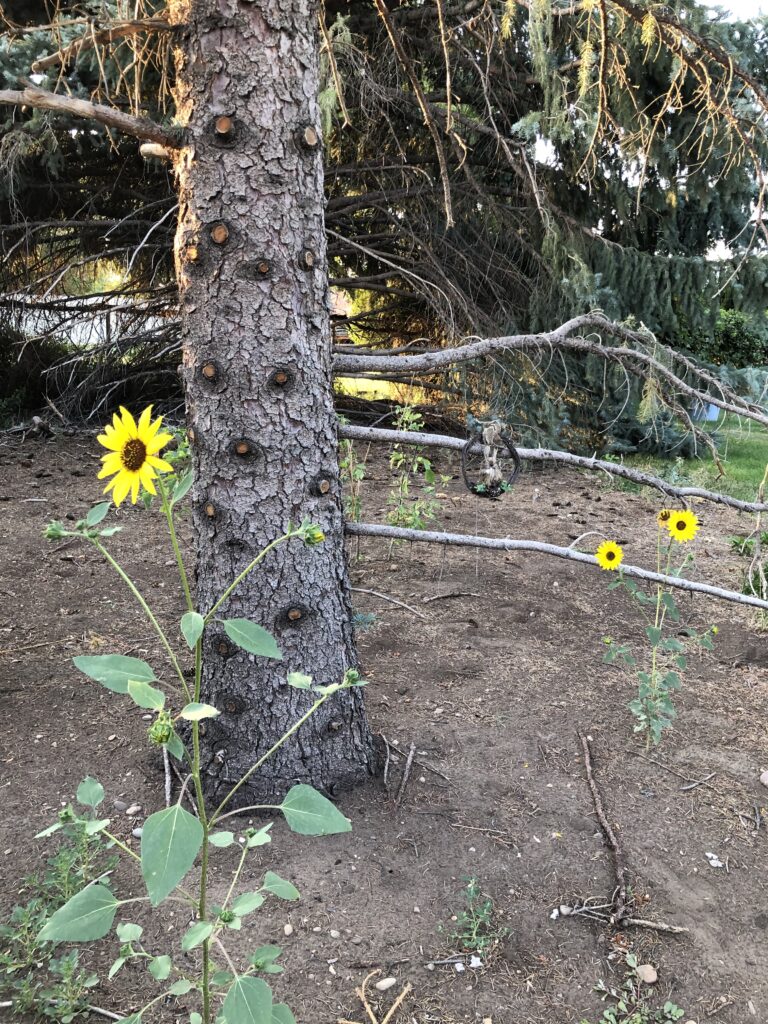
Deaths
We had three family dogs during the time we lived here – all Boston Terriers. Molly passed away in the house after our two married daughters also got Bostons. One daughter asked us to take care of Cecil when she had a new baby and he never left our home, until he went to the Vet with a tumor. Our other daughter’s dog Mardi went downhill after that and when he died we buried him in the backyard – actually not far from where the sunflowers sprung up.
I often commented that we would probably die here. I never meant that to be literally on the road behind our house, which luckily was a near miss for my husband. Our final departure came after some very sad times.
When you live in a neighborhood for 44 years, you see neighbors move out and new ones move in. You also experience people dying. It became sad at times to walk through the neighborhood and think about who used to live where and they are not there anymore. We lost a neighbor across the street from COVID. It was a total surprise for me to see emergency vehicles there and then to learn that she had died there alone. I didn’t even know she was sick.
In one year, we lost elderly neighbors on both sides of us. The loss of the one turned into an ugly family feud. We tried to support the son who had lived there with his mother for years, whose siblings wanted out. One day I came home to emergency vehicles and neighbors all over. He and his wife were found dead in the basement, where the siblings had confined them to living. It made me so sad just coming home and seeing their house. I was glad that by that time I had started the process to move away.
A Sign

In August 2023 driving home during a storm I chased a rainbow. As I stopped on the highway at the intersection before ours, I took a photo through the windshield. By the time I got home and wandered through the backyard I was able to capture the full double rainbow.
Leaving the Highway Behind
Learning from two fires, two accidents, and two storms in the same places, I was feeling some dread for a potential third strike. It had been getting harder as we were aging to maintain an old house and a large out of control yard. I said more than one year that this would be my last one shoveling snow off a huge driveway or dealing with all the yard work. Finally in 2024 we made the move to a patio home with an HOA. Now someone else lives in our house, but we took the memories with us.

